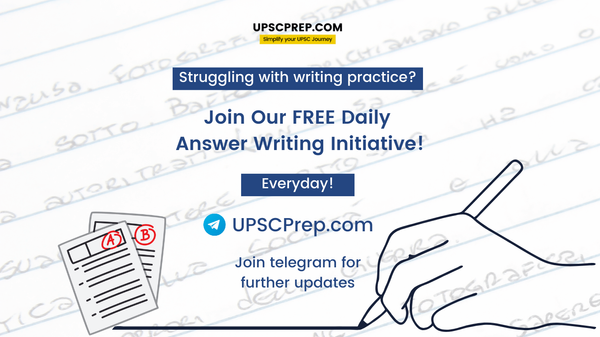Subject: GS 4
Syllabus: Case Study
Questions
- The issues confronting humanity are multifaceted - from political conflicts and human rights abuses to pandemics and climate change. They are not contained within national borders, nor do they fit into the silos of separate government agencies or academic specialties. What is required is greater international cooperation, mutual respect, abiding by international laws and participative global decision-making. However, over the last decade, it has been observed that international relations have overshadowed these basic tenets of global governance and now we are at the verge of serious global catastrophic risks. When it comes to the structures of global governance, business as usual, is no longer an option. Not only an improvement in our understanding of risks is required but also taking responsibility to lead collective action for a coordinated global response.
a. What do you think are the factors hindering collective actions?
b. Provide a case for the moral obligation of the international community to come together and find solutions to the problems we face.
c. What should be the principles guiding such international cooperation? - Mohit Kumar has been appointed as Superintendent of Police in a communally sensitive district of Rajasthan. A terrorist has been given capital punishment and local organisation has asked police to carry out procession on day of execution of death penalty. Situation is sensitive as locals belonging to community of terrorist believe that injustice has been done.
Mohit has been asked to decide on a permit, as allowing it may lead to uncontrollable situations and clashes. And not allowing may further alienate the community. Analyse the situation from different perspectives and explain what decision must Mohit take under such a scenario.
Download Model Structures PDF
Model Structures
Q1. The issues confronting humanity are multifaceted - from political conflicts and human rights abuses to pandemics and climate change. They are not contained within national borders, nor do they fit into the silos of separate government agencies or academic specialties. What is required is greater international cooperation, mutual respect, abiding by international laws and participative global decision-making. However, over the last decade, it has been observed that international relations have overshadowed these basic tenets of global governance and now we are at the verge of serious global catastrophic risks. When it comes to the structures of global governance, business as usual, is no longer an option. Not only an improvement in our understanding of risks is required but also taking responsibility to lead collective action for a coordinated global response.
a. What do you think are the factors hindering collective actions?
b. Provide a case for the moral obligation of the international community to come together and find solutions to the problems we face.
c. What should be the principles guiding such international cooperation?
(250 marks)
Introduction
- Global catastrophic risks such as international conflicts, terrorism, economic instability, climate change, environmental degradation, pandemics, food and water shortage, nuclear threats etc. are all interconnected risks and cannot be managed in isolation within a single country's border.
- To avert the mentioned risks, international cooperation and global decision-making are required.
Main Body
- Factors that hinder collective international action
- Increasing international disputes:
- Disputes such as the Russia-Ukraine conflict, skirmish between Chinese and Indian troops at the Galwan valley, have not just generated inter-state conflicts but have also threatened global peace.
- It has also led to the emergence of various power blocs.
- Rise of authoritarianism:
- Autocratic regimes across the world are increasingly turning hostile to any kind of criticism, showing disregard to dissent, mutual respect and cooperation, violation of international laws, etc.
- This has been witnessed in Syria wherein chemical weapons were allegedly used on citizens.
- In North Korea, alleged killing of people to contain COVID spread.
- Institutional inertia:
- Inter-governmental institutions formed to facilitate cooperation, ensure peace, security, development and environmental integrity, are increasingly gridlocked and inadequate for the scale of challenges at hand.
- Lack of UNSC reforms reflects such institutional inertia.
- Increasing protectionism:
- Globalization has created a new kind of vulnerability, due to inward domestic policies and rising economic nationalism of developed nations such as the US.
- This has been exacerbated by the US-China trade war.
- Asymmetrical relationships:
- International relations are characterized by severe asymmetries in terms of access to resources, power and outcomes.
- While poor and developing countries must abide by and/or shoulder the effects of global governance rules and regulations, they have limited influence in shaping them.
- This has also resulted in conflicting demands of developed and developing countries on forums such as the World Trade Organization.
- Increasing international disputes:
- Moral obligation for international cooperation to find solutions:
- Global responsibility:
- In the face of climate change crises global action is required for preserving the environment, as the cause and effects of these problems lie across different parts of the world.
- It has been found that the Least Developed Countries (LDCs) and Small Island States are the most vulnerable to climate change, while they do not have resources to tackle it.
- Transparency in handling issues:
- In the absence of timely action and following international guidelines, a disease outbreak can become a global pandemic.
- This was witnessed during the handling of the COVID-19 pandemic by the global community.
- Intergenerational equity:
- International cooperation is pertinent for ensuring the very survival of the human race, which is threatened by weapons of mass destruction, nuclearisation, biological warfare, etc.
- Responsibility of the present generation to ensure sustainable development for a better world for the future generations.
- Humane solutions to human-induced issues:
- Problems such as North-South divide, trade wars, unsustainable use of resources etc. are human-induced problems driven by our greed.
- It is our duty to work together and solve these.
- As Gandhiji has rightly said, ‘the world has enough for everyone's need, but not enough for everyone's greed.'
- Global responsibility:
- The principles guiding such international cooperation include:
- Common But Differentiated Responsibilities (CBDR):
- This should be the core principle among countries in terms of their contribution and historical responsibilities in a collective effort to combat climate change.
- Mutual Respect: The countries need to have mutual respect for each other’s territorial integrity and sovereignty.
- Global collective action: International institutions need to be representative and accountable.
- Decision-making procedures need to be democratic, inclusive and transparent.
- Effective global governance and partnership can be achieved when parties agree to a minimum set of global commons, which is required for collective action.
- Peaceful resolution of disputes: Countries should settle their international disputes by peaceful means in such a manner that international peace and security, and justice, are not endangered.
- Common But Differentiated Responsibilities (CBDR):
Conclusion
- With the enormity of problems facing humanity, there is a need for ethical conduct in international relations for maintaining peace, harmony, trust, respecting plurality and diversity and addressing gaps in economic and social justice.
Q2. Mohit Kumar has been appointed as Superintendent of Police in a communally sensitive district of Rajasthan. A terrorist has been given capital punishment and local organisation has asked police to carry out procession on day of execution of death penalty. Situation is sensitive as locals belonging to community of terrorist believe that injustice has been done.
Mohit has been asked to decide on a permit, as allowing it may lead to uncontrollable situations and clashes. And not allowing may further alienate the community. Analyse the situation from different perspectives and explain what decision must Mohit take under such a scenario.
(250 words)
Introduction
- This case study is a classic example of injustice that may creep into either side whichever course of action is taken. It has the potential to break independence and social unity which makes it an administrative challenge to prevent a sense of deprivation while respecting sentiments of all communities.
Main body
- Values and issues involved-
- Internal security and rule of law.
- Sense of injustice.
- Respecting the decision of the judiciary.
- Freedom to express the community.
- Officer’s dedication to duty.
- Courage of conviction and objectivity.
- The organisation feels that by accepting their demands, alienation of the community can be prevented and positive sentiments can be generated. But procession can increase chances of communal clashes. Also, no right is absolute and can be restricted on grounds of national security and law and order.
- Police have to balance law and order and religious sentiments. Allowing procession will mean dishonoring lost lives in terrorist attack and will cause inconvenience to the public. Instead, prayers at burial ground can be allowed by taking religious leaders into confidence, because death is a matter of sorrow and grief.
- Accepting demands of organisation may also result in glorifying death and making the person a martyr. It might lead to indoctrination and challenge the legitimacy of the state.
- In my view, the officer can allow prayer at burial site rather than procession as-
- It is easy to administer.
- Administration cant appear to be apathetic to sentiments of the community.
- Inconvenience can't be done to other members of society.
- Allowing procession will set a bad precedent.
Conclusion
- In long term for holistic course of action, root cause of sympathy for terrorist needs to be identified and to prevent feeling of injuistice and alienation.

Write UnLimited Course (1 Year)
Write answers from any source, we will evaluate them for you.
